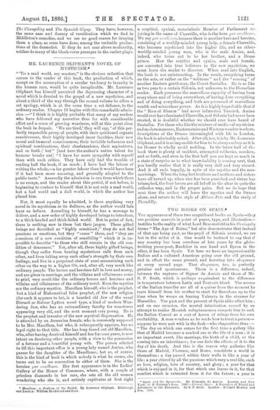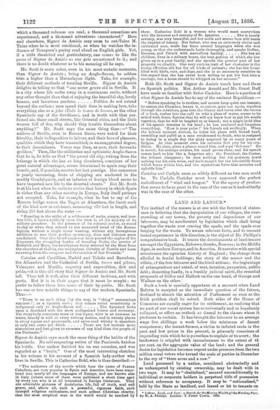TWO BOOKS ON SPAIN.• THE appearance of these two magnificent
books on Spain—they are positive marvels in point of paper, type, and illustration— testifies to the reality of what Lord Beaconsfield in his Coningsby terms " The Age of Ruins," but also demonstrates that instead of that age being past, as the pupil of Sidonia averred, we are but in the midst of it. One would be inclined to say that if any country has been overdone of late years by the globe- trotting prose-poet, Baedeker in one hand and Byron in the other, it has been Spain. Yet here we have an impressionable Italian and a cultured American going over the old ground, and in effect the same ground, and bursting into eloquence at every second page. That eloquence, too, is perfectly
genuine and spontaneous. There is a difference, indeed, between the raptures of Signor de Amicis and those of Mr. S. P. Scott, which is perhaps exquivalent to the difference in temperature between Latin and Teutonic blood. The nerves of the Italian traveller are all of a quiver from the moment he tears himself from his mother to start for Barcelona up to the time when he weeps on leaving Valencia in the steamer for Marseilles. The past and the present of Spain alike affect him ; and on one occasion, the mental intoxication caused by an attempt to realise Moorish voluptuousness compels him to seek the Italian Consul as a sort of haven of refuge from his own excitability. A man wonders as he reads how to treat a person— suppose he were wet with in the flesh—who rhapsodises thus :— " The day on which one enters for the first time a gallery like that of Madrid becomes a marked one in the life of a man ; it is an important event, like marriage, the birth of a child, or the coming into an inheritance; for one feels the effects of it to the day of his death. And this is the reason why galleries like those of Madrid, Florence, and Rome, constitute a world in themselves ; a day passed within their walls is like a year of life; a year stirred by all the passions which vary a real life, such as love, religion, love of country, and glory ; a year for that which is enjoyed in it, for that which one learns in it, for that comfort which is extracted from it for the future ; a year in
• Spain and the Spaniards. By Edmond° de Ankle. London and New York G. P. Putnam's Sons. 1886.—Through Spain. A Narrative of Travel and Adventure in the Peninsula. By 8. P. Scott. London: 11 chard Bentley and Son. 1886.
which a thousand volumes are read, a thousand sensations are experienced, and a thousand adventures encountered." Here and elsewhere, Signor de Amicis may seem to out-Taine M. Taine when he is most emotional, as when he watches the in- fluence of Tennyson's poetry read aloud on English girls. Yet,
if a trifle theatrical and gesticulatory, one comes to like the prose of Signor de Amicis as one gets accustomed to it; and there is no doubt whatever as to his meaning all he says.
Mr. Scott is more sober, even in his most ecstatic moments, than Signor de Amicis ; being an Anglo-Saxon, he seldom tries a higher than a Macaulayan flight. Take, for example,
their different methods of treating Seville. Signor de Amicis delights in telling us that "one never grows old in Seville. It is a city where life melts away in a continuous smile, without
any other thought than that of enjoying the beautiful sky, lovely
houses, and luxurious gardens Politics do not extend beyond the surface; men spend their time in making love, take everything else as a joke (Todo lo tomar de broma, as the other Spaniards say of the Sevillians), and in truth with that per- fumed air, those small streets, like Oriental cities, and the little women full of fire, why should they trouble themselves about anything ?" Mr. Scott says the same thing thus :—" The
natives of Seville, even in Roman times, were noted for their frivolity, their indisposition to labour, and their love of pleasure, qualities which they have transmitted, in an exaggerated degree, to their descendants. Venus was then, as now, their favourite goddess." Then, like the utilitarian and optimistic Anglo-Saxon that he is, be tells us that " the proud old city, waking from the lethargy in which she has so long slumbered, conscious of her great natural advantages, seems determined to again reap their benefit, and, if possible, recover her lost prestige. Her commerce is yearly increasing, fleets of shipping are anchored in the muddy Guadalquivir, and an infusion of foreign blood seems to have imparted new life to the deserted streets." But Mr. Scott is at his best when he seeks to revive that history in which Spain is richer than any other country in Europe, Italy itself perhaps not excepted. Take, for example, what he has to say of the Roman bridge across the Tagus at Alcantara, the finest work of the kind now in existence, measuring 670 feet in length, and rising 210 feet above the water :—
" Standing in the midst of a wilderness of rocks, gorges, and tree- less hills, it bursts suddenly upon the view in all the majesty of its solitary grandeur. In the presence of its colossal arches, as sound to-day as when they echoed to the measured tread of the Roman legions, without a single stone wanting, without any incongruous additions to mar their perfect symmetry, time and distance seem annihilated. Over this broad causeway have passed the eagles of the Emperors, the straggling hordes of invading Goths, the armies of Roderick and Musa, the sacrilegious booty wrested by the Moor from the churches of Galicia, the triumphant chivalry of Castile and Leon returning from the conquest and devastation of fair Granada."
Catalan and Castillian, Madrid and Toledo and Barcelona, the Alhambra and the Cathedral of Seville, torero and gitano, Velasquez and Murillo, coquetry and superstition, dirt and pride,—it is this old story that Signor de Amicis and Mr. Scott
tell. They tell it well, after their different fashions, and with gusto. But it is in their pages that it must be sought ; we prefer to follow them into some of their by-paths. Mr. Scott has one or two notable things to say of the modern Spaniards. Thus :—
" There is no such thing [by the way, is "thing" unconscious sarcasm as a Spanish snob ; that odious social monstrosity is
indigenous only to Anglo-Saxon soil The Spaniard looks upon a drunkard with the most undisguised horror and contempt. Yet everybody consumes more or less liquor, wine is as common as water, brandy is sold at every railway station, and in twenty places in every square and promenade, and anise-seed whisky is abundant
at only two cents per drink There are few mortals more abstemious and less given to excesses of any kind than the people of the Peninsula."
Signor de Amicis says much the same thing of the habits of the Spaniards. No self-respecting native of the Peninsula finishes his bottle. Our author finished his on one occasion, and was regarded as a "brute." One of the most interesting sketches in his volume is his account of a Spanish lady-author who lives in Seville. This is Catherine Bohl, who is thus described:—
" The authoress of the novels which bear the name of Fernan Caballero, are very popular in Spain and America, have been trans- lated into nearly all the languages of Europe, and are known also in Italy (where some of them were published a short time ago) by every one who is at all interested in foreign literature. They are admirable pictures of Andalusian life, full of truth, soul and grace, and, above all, such a powerful, vigorous faith, such intrepid religions enthusiasm, and such ardent Christian charity, that the most sceptical man in the world would be touched by them. Catherine Bohl is a woman who would meet martyrdom
with the firmness and serenity of St. Ignatius She is nearly seventy, was very beautiful, and her noble and serene face still bears the imprint of beauty. Her father, who was an extremely clever and cultivated man, made her learn several languages when she was young, so that she understands Latin thoroughly, and speaks Italian,
German, and French with marvellous facility She has no children, lives in a solitary house, the best portion of which she has given np to a poor family, and she spends the greater part of her property on charity. One very curious trait of her character is the strong affection she has for all kinds of animals; she has her house filled with birds, cats, and dogs, and she is so extremely sensitive in this regard that she has never been willing to put her foot into a carriage, lest a horse should be whipped on her account."
Both Mr. Scott and Signor de Amicis touch here and there on Spanish politics. Mrs. Arthur Arnold and Mr. Grant Duff have made us familiar with Senor Castelar. Here is a portion of what Signor de Amicis has to say of the eminent Republican :- " Before speaking he is restless, and cannot keep quiet one instant; he enters the Chamber, leaves it, re-enters, goes our again, wanders through the corridors, goes into the library and turns over the leaves of a book, rashes into the cafe to take a glass of water, seems to be seized with fever, fancies that he will not know how to put his words together, that he will be laughed at or hissed ; not a single lucid idea of his speech remains in his head ; he has confused and forgotten everything. ' How is your pulse ?' his friends ask smilingly. When the solemn moment arrives, he takes his place with bowed head, trembling and pallid as a man condemned to death, who is resigned to losing in a single day the glory acquired by So many years of fatigue. At that moment even his enemies feel pity for his con- dition. He rises, gives a glance round him, and says `Senores!' He is saved ; his courage returns, his mind grows clear, and his speech comes back to him like a forgotten air ; the President, the Cortes, the tribune disappear ; he sees nothing but hie gestures, hears nothing but his own voice, and feels naught but the irresistible flame which burns within him, and the mysterious force that sustains and upholds him."
Castelar and Carlyle seem as widely different as two men could be. To Carlyle, Castelar must have appeared the perfect embodiment of "wind and tongue." Yet the agony of produc- tion seems to be as great in the case of the one as it undoubtedly was in the case of the other.



































 Previous page
Previous page